|
|
 
|
Links to Liberia
Gateway
B
|
Liberian Internet Pages
Click and Go
|
SPECIFICATIONS
|
|
Next Link Page
|
Links in Alphabetic order
[A]
[B]
[C]
[D]
[E]
[F]
[G]
[H]
[I]
[J]
[K]
[L]
[M]
[N]
[O]
[P]
[Q]
[R]
[S]
[T]
[U]
[V]
[W]
[X]
[Y]
[Z]
|
|
BAN LANDMINES

|
International Campaign to Ban Landmines
The ICBL calls for:
An international ban on the use, production, stockpiling, and sale, transfer, or export of antipersonnel landmines.
The 1997 treaty banning the use, production, stockpiling, and transfer of antipersonnel landmines has been ratified by 118 countries and signed by 140 . Since the treaty became law, countries may no longer sign it, they must accede. Those countries which have already signed, must still ratify in order to be fully bound by the ban provisions.
|
|
BARCLAYVILLE
|
Barclayville, the capital and most populous settlement in Grand Kru County is located in southeastern Liberia about
10 miles inland from Picinicess. The Barclayville township of several thousand people straddles the banks of the
Nu River. Roads from Kanweaken to the northwest, Pleebo to the southeast, and to coastal Picinicess and Grand Cess
all intersect at Barclayville.
The modern jurisdiction of Barclayville was created by President Barclay in response to the last Kru Wars in the 1930s.
As part of the effort to exert central government authority and diminish inter-tribal conflicts that resulted in
devastation, four separate villages were combined into one township. Until the creation of Barclayville, the
contituent villages of Seetor and Kayken, which are from rival chiefdoms, were in periodic conflict. The villages
of Seetor, Kayeken and Wakpeken and their "suburbs" are on the northwest side of the Nu river while Topor, is on
the opposite bank across from Wakpekan. Despite the town's large size, most structures are made from mud and stick
and (as of the mid 1980) few have running water or electricity. Kplio (a dialect of Grebo) is the primary language
of all Barclayvillians but English is the official language of instruction.
The regional high school is in Barclayville along with several public and private (Christian) schools for grades
K-8. Many religious denominations have churches and/or missions in Barclayville including Methodist, Baptist,
Catholic, and a variety of evangelical congregations, though most of the population also follows local animist
practices. Prior to the Liberian civil war much of the male adult population were on government payroll employed
as teachers, employees of the courts, or serving as government officials or their staff. Nevertheless, upland
rice farming is the primary occupation. Each village lays claim to large areas of land that extend several miles
from town upon which they do slash and burn farming, rotating to a new section of land every year. Because of
the distance of the farms from the village it is common for the women and younger children to live on the farms
during the growing season where they establish vegetable gardens and plant cassava. Farming within the town is
limited by the presence of freely roaming livestock and fowl including cows, sheep, goats and chickens.
In June 2005 the UN Integrated Regional Information Regional Network reported that the bridge across the Na
river was destroyed during the civil war and that the roads leading to Barclayville had decayed and become
overgrown by dense bush rendering them impassable.
|
|
Arthur Barclay

(1854–1938)
|
Arthur Barclay was the 14th President of Liberia, serving from November 4, 1904 until January 1, 1912,
representing the True Whig Party. He had previously served as Secretary of the Treasury under his predecessor,
Garretson W. Gibson. Barclay was born on July 31, 1854 in Bridgetown, Barbados, and was educated in Liberia.
Father to Anthony Barclay, who later served on the Liberian Supreme Court and Uncle to President Edwin Barclay.
Arthur Barclay is also the grandfather to Mai Barclay Roberts, a noted member of the clergy and regarded as
one of Liberia's most influential religious officials. In the late 1920s, he was a member of a League of Nations
commission into the recruitment and selling of contract labour as slaves. The scandal, which caused much of the
government to resign, ended with Arthur Barclay's nephew, secretary of state Edwin Barclay becoming president of
Liberia. Other members of the Barclay clan include: Marjorie Cooper, Elizabeth Cooper, Anthony Barclay,
Dr. Murray Barclay, Dr. Emanuel Barclay, Wokie Mai Weah, Charles Benedict Roberts, Juanita Roberts Ramirez,
Ida Johansson, Elise Cooper, Ode Cooper,
(From Wikipedia, the free encyclopedia)
|
|
Edwin James Barclay

(1882-1955)
|
Edwin James Barclay became President of Liberia in 1930 when President King and Vice-President Allen B. Yancey
resigned because of a scandal. He was elected in his own right for the first time in 1931.
Edwin Barclay's paternal grandparents moved from Barbados to Liberia with their children in 1865. Edwin's father,
Ernest Barclay and uncle, Arthur Barclay were also important Liberian politicians. In 1901, at the age of 19, Edwin
wrote a Liberian patriotic song, "The Lone Star Forever."
Edwin Barclay, a member of the True Whig Party which ruled at that time, served as foreign minister and secretary
of state of Liberia in the government of Charles D.B. King from 1920 until 1930. Barclay is credited with helping the
country survive some of Liberia's greatest threats to its sovereignty in that country's history. They included threats
by the League of Nations led by Germany, the United Kingdom and the United States to recolonize the country
unless reforms were made, aggressive actions by France and a coup attempt by the Firestone Tire and Rubber
Company which owned much of Liberia's land. Barclay retired in 1944 and was replaced by William Tubman.
(From Wikipedia, the free encyclopedia)
|
|
Nat Barnes

|
Milton Nathaniel Barnes was born on April 6, 1954; the second of four children of Roland T. and Eudora N. Barnes,
in Monrovia, Liberia. Nat Barnes spent his formative
years in Harper, Maryland County and Monrovia, Liberia. He attended the University of Liberia for
one semester and worked at a bank for a year, before eventually going to the United States for college. Nat
entered Rider University (then Rider College) in Lawrenceville, New Jersey in 1975 where in majored in Finance.
Upon acquiring a B.Sc. degree from Rider in 1978, Nat matriculated to Pace University in New York City where
he obtained an MBA with concentration in Finance and Banking in 1979.
In September of 1999, Nat was appointed to the position of Minister of Finance, Republic of Liberia. In that
capacity, he became the chief architect of Liberia's fiscal program. During his tenure as Minister, he oversaw
and implemented a new Tax Code for Liberia in consultation with the Fiscal Affairs Department of the International
Monetary Fund. In July of 2002, he was terminated from the position of Minister of Finance. On 8 October 2005 he was
in the race for the Presidency of Liberia.
|
|
Bassa Highschool Association

|
We, the graduates, former students, and faculty of Bassa High School, residing in the United States of America.
Aware of the ever growing need to unite as a team to assist our institution in its endeavor to continue imparting
useful knowledge to the young people of Liberia and thereby preparing them for a complex and sophisticated world
while concurrently giving them a sound academic education with good moral principles; We owe it to the Almighty
God and humanity to meaningfully contribute our quota to the development of our beloved institution. Cognizant of
the need to foster the above goals and objectives and committed to the continuing growth of the institution, We
do hereby resolve and constitute ourselves into an organization to be called Bassa High School Association, U.S.A.
|
|
BASSA HOME PAGE

|
Hilolombi ("The-Greatest-Because-The-Eldest"), the Creator, placed His twin sons, Kwan and Koba,
into Licee Libisu (the Original Egg, the World). Kwan came out first and committed incest with
his mother Hisi (Earth). Angered, Hilolombi sent Nkwaada (Chaos) upon Nkong u Hisi (Hisi's land,
the Earth) by simply dimming Djob (His eye, the sun).
The Bassa are a people of Liberia, living in
Grand Bassa, Rivercess, and Montserrado counties speak a Kru language. They number about 350,000
(as of 1991). They have their own writing system, called "Bassa" or "Vah".
There are also a few in Sierra Leone. There is a different group of people called Bassa (also spelled Basa or Basaa)
in Cameroon. These people, numbering approximately 230,000, are Bantu. Their language is the Basaa language.
|
|
John Berestecky
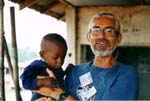
|
In July, John Berestecky, Assistant Professor in Microbiology, was in war-torn Liberia, observing elections
that followed seven years of civil war. The purpose of these 30 election observers were to ensure a fair and
legal election. Observers would visit villages and polling sites to discuss the election with villagers and poll
workers. "I'd say I talked to easily 10,000 people while I was there," said Berestecky.
|
|
BBC Africa

|
The BBC Internetsite about Africa/Liberia.
|
|
Bengoma

|
If you are new to this website and wonder what BENGOMA is? Bengoma is the Liberian Mandingoes non-profit
organization located in Netherlands. To keep it short, BENGOMA means in English, "speaking with one voice".
This site has been created to provide and foster a sense of community, raise awareness of the Internet
among Liberian Mandingo in the Netherlands at home and abroad. There's no better place for Liberian Mandingo
than right here. You've just found the site with the most Liberian Mandingo in one place. The proof is
in the pudding.
|
|
Stephen Allen Benson
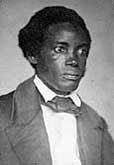
[May 21, 1816—1865]
|
Stephen Allen Benson (May 21, 1816—1865) was president of Liberia from 1856 to 1864.
Benson was born in Maryland, United States. In 1822 his family expatriated to the newly created country of
Liberia. Shortly after his arrival, the colony was taken over by African natives, holding Benson and his relatives
captives for a few months.
He became a successful businessman. Benson joined the militia in 1835 and in 1842 became a delegate to
the Colonial Council. After Liberia's independence in 1847 he became a judge.
In 1853 Benson became the vice president to Joseph Jenkins Roberts, and in 1856 Benson succeeded Roberts
as president. In 1857 he organized the annexation of Maryland County.
In 1862 Liberia was recognized by the United States. That same year he visited Europe.
Benson, who knew many indigenous languages, sought collaboration with the native tribes, in contrast to
previous Liberian policy.
After the end of his presidency, he retired to his plantation in Grand Bassa County, where he died in 1865.
|
|
Kenneth Best
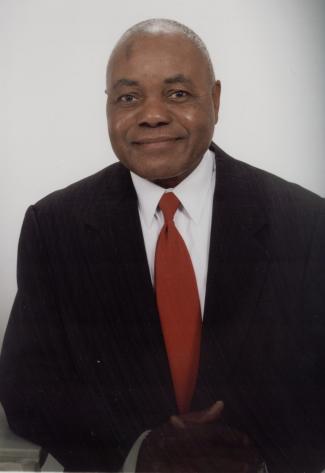
|
Born on Oct. 28, 1938, in Harrisburg, Liberia, Kenneth Y. Best founded the West African country’s first independent daily newspaper, the Daily Observer, in February 1981. Kenneth Best founded the first independent newspapers in the undemocratic nations of Liberia and The Gambia. His reporting gave a voice to poor and oppressed people but made him unpopular with governments.
|
|
BESTWA

|
BESTWA (pronounced Best Way) stands for Building Economic Success Together in West Africa. Its aim is to
improve the economic condition of the poorest of the poor in West Africa, beginning in Liberia.
|
|
Former President of Liberia
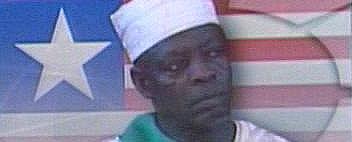
MOSES BLAH
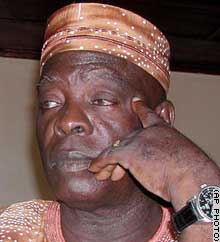
|
Moses Blah has been at President Charles Taylor's side since they trained together in Libya's guerrilla camps,
and launched the uprising that hurled Liberia into nearly 14 years of bloody strife. Blah and Taylor spent three
years together in Moammar Gadhafi's Libya before crossing back into Liberia to launch Taylor's 1989 rebellion against
then-President Samuel Doe. Both shared a bitter hatred of Doe, whose forces killed Blah's first wife in an
ethnic-fueled massacre of hundreds of civilians seeking shelter in a Monrovia church. The seven-year war that
followed killed more than 100,000 Liberians, and left the once-prosperous country in ruins. Despite their
long-standing friendship, Blah was arrested for 10 days in June on suspicion of conspiring with Americans to
overthrow Taylor. Blah says the incident was a misunderstanding and says the two leaders have smoothed things
over. Despite Blah's fearsome reputation, he is an unassuming man who drives himself around the shell-scarred
capital in a Jeep -- in contrast to the flashy motorcades of other government officials. Since becoming vice
president in 2000, he has abandoned his olive green uniform for flowing African robes and expresses irritation
about the gunmen who trail him wherever he goes for security reasons. A mechanic by training, Blah has traveled
extensively, first as a student in Germany, later as emissary for Taylor's war faction, and finally as Liberia's
ambassador to Libya and Tunisia.
|
|
BOMI COUNTY
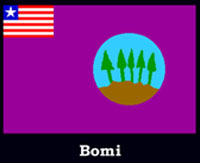
|
Tubmanburg, also known as Bomi, is the capital of Bomi County in Liberia. It lies in the Bomi Hills north of
Monrovia and was an iron ore and diamond mining centre until is was largely destroyed in the Liberian Civil War.
It was the headquarters of the LURD (Liberians United for Reconciliation and Democracy) rebel group.
|
|
BONG COUNTY
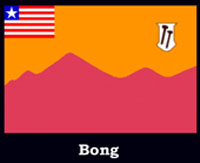
|
BONG COUNTY
|
|
Bong Town "DOT.COM"
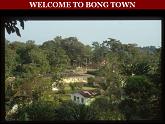
|
Robert Kranz is still working on this site, but nonetheless, as he is working on these pages daily, more
and more data will be uploaded in the near future. If you have information, data and/or pictures, then please
feel free to send them to him for publication.
|
|
Bong Town "DOT.COM"
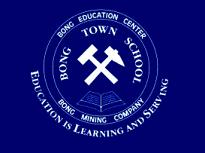
|
After many years of dormancy, this organization was established through hard and harrowing initiatives
of many former students and instructors around the U.S. For many of us, this is symbolic in varying circumstances.
It is a symbol of Hope for a once vibrant and “ on the upward bound” institution. To others, it can be seen as
a symbol of pride; pride of the nurturing infused. And yet to others, it is symbolic of a sense of belonging;
we were once a close knit group of students who knew each other and our families.
|
|
Donald E. Booth
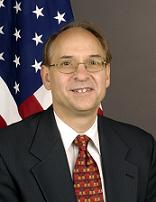
|
Donald E. Booth has been the U.S. Ambassador to Liberia since his arrival in Monrovia on Friday, July 29, 2005.
Ambassador Booth was confirmed by the United States Senate on June 16 and attested by President George W. Bush
on June 21, 2005 as Ambassador Extraordinary and Plenipotentiary of the United States of America.
Ambassador Booth replaced Ambassador John Blaney who departed Liberia on July 13, 2005.
Prior to this appointment,Ambassador Booth, a member of the Senior Foreign Service, most recently served as
Director of the Office of Technical and Specialized Agencies at the Department of State’s Bureau of International
Organization Affairs.
|
|
Boy Scouts of Liberia
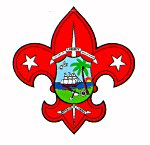
|
Boy Scouts of Liberia Badge
|
|
William Winslow Brown
Liberian Artist
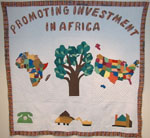
|
William Winslow Brown is a young Liberian refugee living and working in Cote d'Ivoire. Using traditional Liberian quilting techniques learned from his family, he creates original and commissioned designs using local, natural fabrics.
|
|
Charles W. Brumskine
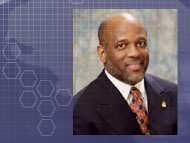
|
Politician: "I will run for president regrettably not against Charles Taylor..." he says.
Charles W. Brumskine is an attorney, internationally recognized as a Liberian law expert who has practiced
law for two decades. He served as Senior Partner of Brumskine & Associates, one of the largest and most
renowned law firms in Liberia. After the Liberian civil war, he campaigned for and won a seat in the Liberian Senate.
Senator Brumskine served as President Pro Tempore of the Senate. Charles Brumskine also taught law at the L.A.
Grimes School of Law, University of Liberia, both as an Assistant Professor and as an Adjunct Professor. As
an Assistant Professor (1983-1985), he lectured on corporate and commercial transactions. As an Adjunct
Professor (1999), he lectured on constitutional law—a comparative study between the U.S. and Liberian
Constitutions.
|
|
Gyude Bryant

|
Charles Gyude Bryant (born January 17, 1949) is a Liberian businessman who was chosen to lead the country's interim
government from October 14 2003 till January 14 2006. Bryant, a member of the Liberia Action Party, is an effective
crisis manager, caution and tactful.
The installation of the transitional government was part of the peace agreement to end the country's second civil war,
which had raged since the Liberians United for Reconciliation and Democracy (LURD) rebelled against President
Charles Taylor in 1999. Bryant was previously a businessman and was chosen as chairman because he was seen as
politically neutral and therefore acceptable to each of the warring factions, which included LURD, the Movement
for Democracy in Liberia (MODEL), and loyalists of former President Taylor. He is a prominent member of the
Episcopal Church of Liberia, and was critical of the governments of Samuel Doe (1980–1990) and Taylor (1997–2003).
|
Robertha Worwlee Budy
Miss Liberia in the USA, 2004

|
In 2004, Robertha Worwlee Budy [Miss Liberia in America] is a 21 years old and currently residing in Suwannee, Georgia with
her parents and four siblings. She is the oldest of five children and a full-time student at Georgia State University,
majoring in Biology and minor in Chemistry. She is inspiring to become a Pharmacist.
|
BOYZ OF SUMMER
ENTERTAINMENT GROUP

|
The Boyz of Summer is a social organization of young Liberian men residing in the United States of America.
They seek to unify Liberians living within the United States and those living in the Republic Of Liberia through
social, cultural, education events.
|
|
Buchanan
|
Buchanan is the second largest port in Liberia and is the port for the dormant railway to the iron ore mines at Nimba,
lying on Waterhouse Bay, part of the Atlantic Ocean. Named after James Buchanan, it is also the capital of Grand Bassa
and lies east of Monrovia. The town was popular with refugees during the Liberian Civil War as it largely escaped the
fighting. Fishing is another important industry in the town.
|
|
Bulbul
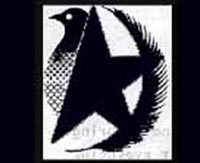
|
National bird or Pepperbird.
|
|
BUSHMEAT Project
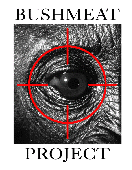
|
Mission
to preserve humanity's living wildlife heritage
Goals
- to achieve worldwide recognition of the devastating effects of the commercial bushmeat trade,
- to encourage and organize long-term programs and urgent pilot projects that will stop the slaughter of great apes and other endangered animals,
- to establish viable alternatives to bushmeat commerce that serve people, wildlife, and diverse natural and cultural heritage.
|
|
Next Link Page
|
Links in Alphabetic order
[A]
[B]
[C]
[D]
[E]
[F]
[G]
[H]
[I]
[J]
[K]
[L]
[M]
[N]
[O]
[P]
[Q]
[R]
[S]
[T]
[U]
[V]
[W]
[X]
[Y]
[Z]
|
|
To have your URL also added to these Liberian Internet gateways, please first forward an e-mail request to the LinkMaster at:
|
LinkMaster
All rights reserved!
|
|
|---|